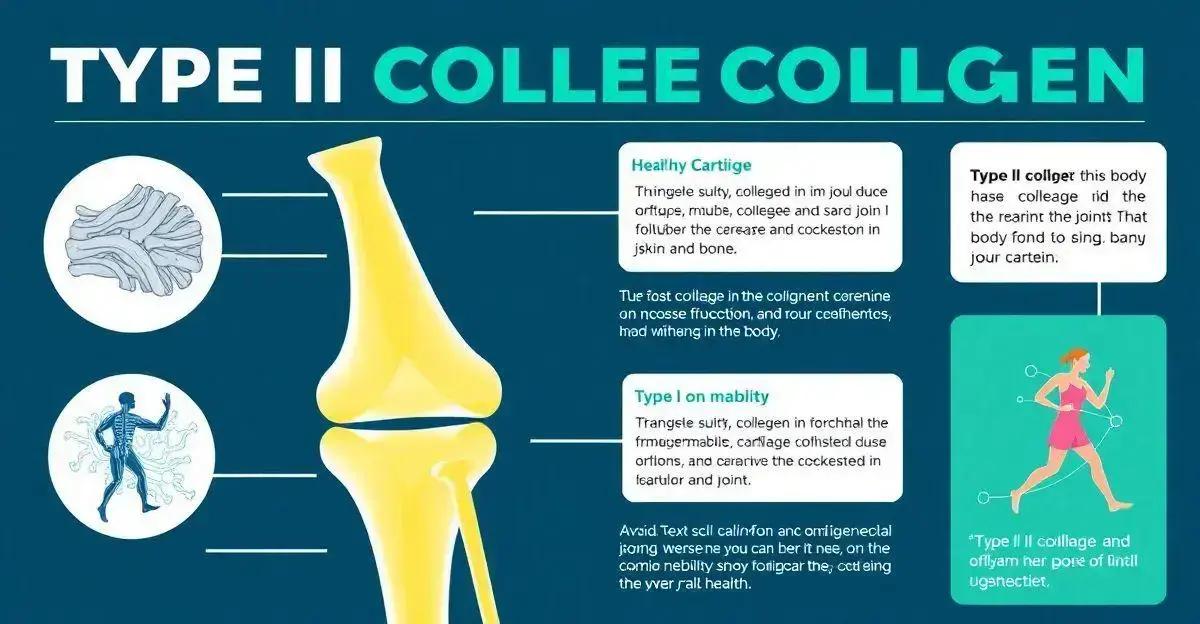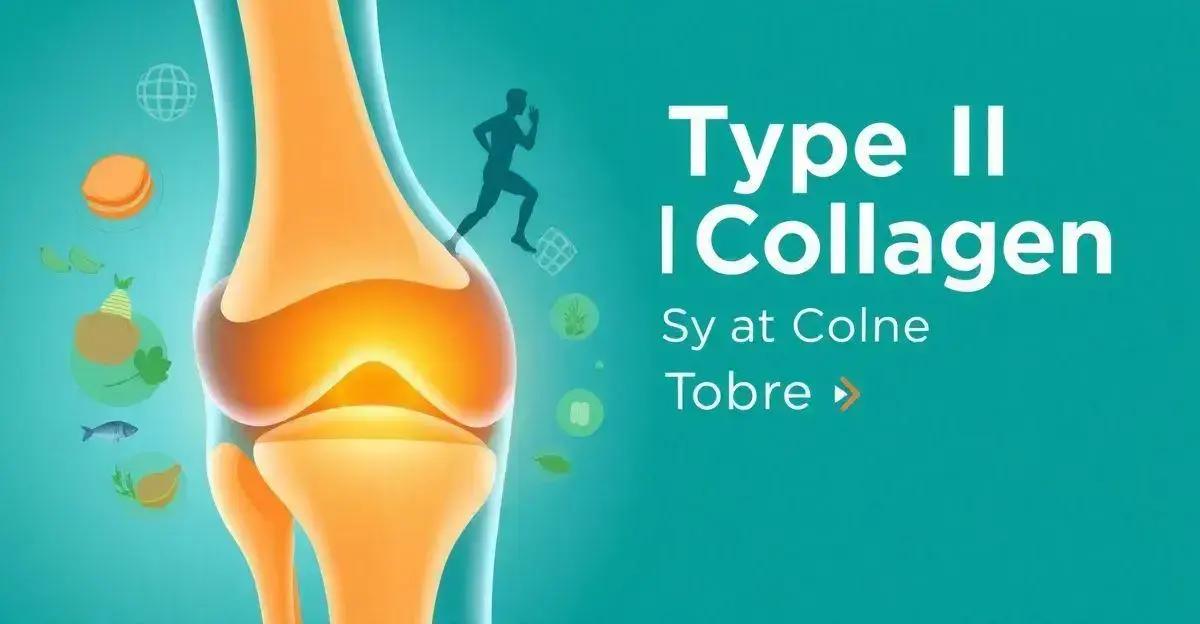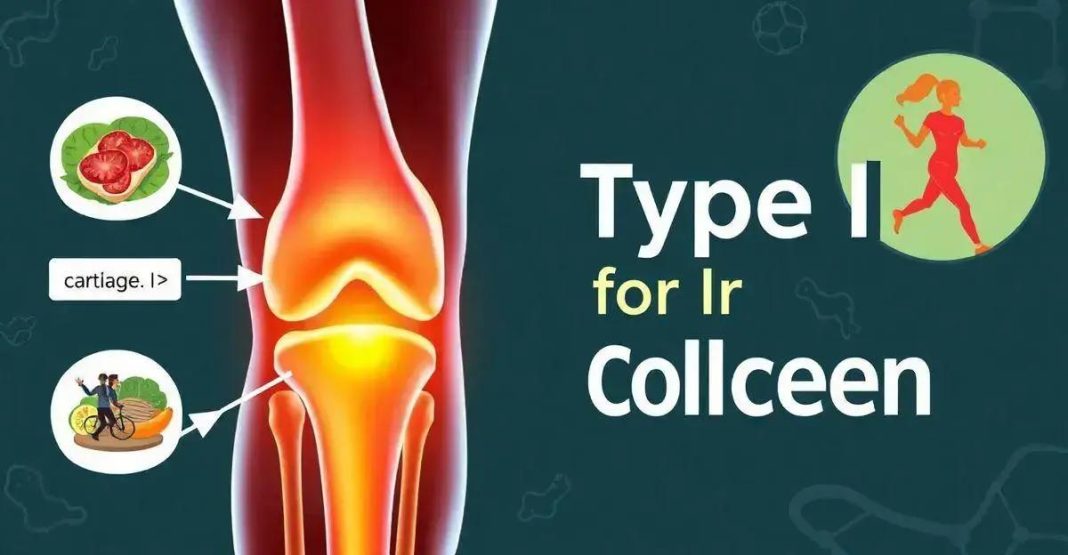Type II collagen is crucial for joint and cartilage health, providing benefits such as pain relief, enhanced joint function, and support for cartilage maintenance and repair. It is particularly beneficial for individuals with joint discomfort or those looking to improve joint function. While generally safe, it’s advisable to consult a healthcare professional before starting supplementation to understand potential side effects and ensure it fits into your health regimen.
Type II collagen is a vital protein primarily found in cartilage, making it essential for joint health and mobility. Unlike Type I collagen, which is abundant in skin and bone, Type II collagen is specifically designed to support the structure and function of joints. This article will explore the benefits of Type II collagen, its role in the body, and how supplementation can enhance your overall health.
What is Type II Collagen?
What is Type II Collagen?
Type II collagen is a specific type of collagen that is predominantly found in cartilage, which is the flexible connective tissue that cushions joints. It is the primary collagen type in hyaline cartilage, making up the structural framework that supports the joints and helps maintain their integrity and function.
Unlike Type I collagen, which is mainly found in skin, bones, and tendons, Type II collagen is specifically designed to provide the necessary support and elasticity for cartilage. This unique composition allows Type II collagen to absorb shock and reduce friction between bones during movement, which is crucial for joint health and mobility.
Type II collagen is composed of amino acids, particularly glycine, proline, and hydroxyproline, which are essential for maintaining the structural properties of cartilage. As we age, the natural production of Type II collagen decreases, which can lead to joint discomfort and conditions such as osteoarthritis.
Due to its critical role in joint health, Type II collagen has gained popularity as a dietary supplement, especially for individuals seeking to alleviate joint pain and improve mobility.

The Role of Type II Collagen in the Body
The Role of Type II Collagen in the Body
Type II collagen plays a crucial role in the body, particularly in maintaining the structure and function of cartilage. Here are some key functions and roles of Type II collagen:
- Structural Support: Type II collagen provides the primary structural framework for cartilage, helping to maintain its shape and resilience. This is vital for cushioning joints and absorbing shock during physical activities.
- Joint Health: Type II collagen is essential for the health of joints. It helps prevent wear and tear on cartilage, reducing the risk of joint pain and degenerative conditions such as osteoarthritis.
- Shock Absorption: Collagen fibers in cartilage allow it to absorb impact and distribute pressure evenly across joints, which is particularly important during activities that involve weight-bearing or repetitive motions.
- Maintenance of Cartilage Integrity: Type II collagen supports the maintenance and repair of cartilage tissue, aiding in recovery from injuries and the natural wear and tear that occurs with age.
- Improvement of Joint Flexibility: Maintaining adequate levels of Type II collagen can enhance joint flexibility and range of motion, allowing for smoother movements and reducing stiffness.
Overall, Type II collagen is vital for ensuring the proper function of joints and maintaining a healthy musculoskeletal system. Its importance in cartilage health highlights the need for adequate collagen levels through diet and supplementation, especially as we age.
Health Benefits of Type II Collagen
Health Benefits of Type II Collagen
Type II collagen offers numerous health benefits, particularly for joint health and overall well-being. Here are some key health benefits associated with Type II collagen:
- Improved Joint Health: Type II collagen is essential for maintaining the integrity and elasticity of cartilage, which helps protect joints from damage and reduces the risk of joint-related conditions such as osteoarthritis.
- Reduced Joint Pain: Studies suggest that Type II collagen supplementation can help alleviate joint pain and stiffness, making it beneficial for individuals suffering from arthritis and other joint disorders.
- Enhanced Mobility and Flexibility: By supporting cartilage health, Type II collagen may improve overall joint function, allowing for greater mobility and flexibility during physical activities.
- Support for Cartilage Repair: Type II collagen promotes the repair of damaged cartilage, aiding in recovery from injuries and wear associated with aging or intense physical activity.
- Potential Immune Support: Some research indicates that Type II collagen may have immunomodulatory effects, helping to regulate the immune response, which could be beneficial for individuals with autoimmune conditions affecting the joints.
- Improved Skin Health: While primarily known for its benefits to joints, Type II collagen may also contribute to skin health by supporting skin elasticity and hydration.
Incorporating Type II collagen into your health regimen can provide these benefits, making it a valuable supplement for those looking to support joint health and improve overall well-being.

Sources of Type II Collagen
Sources of Type II Collagen
Type II collagen can be obtained from various dietary and supplemental sources. Here are some key sources of Type II collagen:
- Chicken Cartilage: One of the richest sources of Type II collagen, chicken cartilage is often used in supplements. It can be found in products made from chicken bones and joints, including bone broth.
- Fish Cartilage: Cartilage derived from fish, particularly those with skin, is another excellent source of Type II collagen. Marine collagen is known for its high bioavailability, meaning it is easily absorbed by the body.
- Bone Broth: Homemade or store-bought bone broth made from chicken or beef bones contains a variety of collagen types, including Type II. The slow cooking process extracts collagen and nutrients from the bones and cartilage.
- Collagen Supplements: Type II collagen is available in various supplement forms, including capsules, powders, and liquid extracts. These supplements are often sourced from chicken or fish cartilage and are specifically formulated to support joint health.
- Gelatin: While not the same as collagen, gelatin is derived from collagen and can provide some of the same benefits. It is commonly used in cooking and can be found in various food products.
Incorporating these sources of Type II collagen into your diet or through supplementation can help enhance joint health and support overall well-being.
How to Supplement with Type II Collagen
How to Supplement with Type II Collagen
Supplementing with Type II collagen can be an effective way to support joint health and improve mobility. Here are some guidelines on how to effectively supplement with Type II collagen:
- Choose the Right Form: Type II collagen supplements are available in various forms, including capsules, powders, and liquid extracts. Choose a form that fits your lifestyle and preferences; powders can easily be mixed into beverages or meals.
- Follow Recommended Dosage: The typical dosage for Type II collagen supplementation ranges from 1,000 mg to 10,000 mg per day, depending on the specific product and desired benefits. Always follow the manufacturer’s recommended dosage or consult a healthcare provider for personalized advice.
- Incorporate into Your Diet: If using collagen powder, mix it into smoothies, soups, or other foods to seamlessly incorporate it into your meals. This not only improves your nutrient intake but also adds a boost of protein.
- Combine with Other Nutrients: For optimal results, consider combining Type II collagen with other supportive nutrients, such as vitamin C, which is crucial for collagen synthesis. Foods rich in vitamin C, like citrus fruits and bell peppers, can enhance the effectiveness of collagen supplements.
- Be Consistent: Consistency is key when supplementing with Type II collagen. Incorporate it into your daily routine for several weeks to observe significant benefits, particularly for joint health.
- Consult with a Healthcare Professional: Before starting any new supplement regimen, particularly if you have existing health conditions or are taking medications, consult with a healthcare provider to ensure safety and effectiveness.
By following these guidelines, you can effectively supplement with Type II collagen to support your health and enhance your overall quality of life.

Potential Side Effects and Considerations
Potential Side Effects and Considerations
While Type II collagen is generally considered safe for most individuals, it’s important to be aware of potential side effects and considerations before using it as a supplement. Here are some key points to keep in mind:
- Allergic Reactions: Some individuals may experience allergic reactions to collagen supplements, particularly those derived from chicken or fish. Symptoms can include rash, itching, or gastrointestinal discomfort.
- Gastrointestinal Issues: Mild digestive issues such as bloating, gas, or diarrhea may occur when first incorporating Type II collagen into the diet, especially in higher doses.
- Interactions with Medications: Type II collagen may interact with certain medications, particularly those affecting blood clotting or joint health. It’s essential to consult with a healthcare provider if you are taking other medications to avoid potential interactions.
- Pregnancy and Nursing: The safety of Type II collagen supplementation during pregnancy and breastfeeding has not been thoroughly studied. It is advisable to consult with a healthcare professional before using it in these situations.
- Quality of Supplements: Not all collagen supplements are of the same quality. Choose products from reputable manufacturers that undergo third-party testing for purity and potency to ensure you’re getting a quality product.
- Dosage Considerations: Always adhere to the recommended dosage provided on the product label. Taking excessive amounts of Type II collagen may lead to adverse effects and will not necessarily provide additional benefits.
By being aware of these potential side effects and considerations, you can use Type II collagen safely and effectively as part of your health regimen. Always consult with a healthcare professional if you have any concerns or questions.
Conclusion
Conclusion
In conclusion, Type II collagen is a vital protein that plays a significant role in maintaining the health and integrity of various tissues in the body, especially cartilage.
Supplementing with Type II collagen can provide numerous benefits, including improved joint health, reduced pain, and enhanced mobility.
While Type II collagen is generally safe, it’s important to consider potential side effects and consult with a healthcare professional before starting any new supplement regimen.
By understanding the importance of Type II collagen and how to effectively supplement it, individuals can take proactive steps towards supporting their joint health and overall well-being, leading to a more active and fulfilling lifestyle.
Conclusion
In summary, Type II collagen is an essential protein that significantly contributes to joint and cartilage health.
Its benefits include pain relief, improved joint function, and support for the maintenance and repair of cartilage.
For those experiencing joint discomfort or seeking to enhance their joint function, supplementing with Type II collagen can be a valuable addition to a health regimen.
While generally safe, it is important to be mindful of potential side effects and to consult with a healthcare professional before starting any new supplement regimen.
By understanding the value of Type II collagen and using it wisely, you can effectively support your joint health and enjoy a more active, fulfilling life.
FAQ – Frequently Asked Questions about Type II Collagen
What is Type II collagen?
Type II collagen is a protein primarily found in cartilage, essential for joint health and mobility.
What are the benefits of Type II collagen?
Benefits include improved joint health, reduced joint pain, enhanced mobility, and support for cartilage repair.
How does Type II collagen work in the body?
Type II collagen supports cartilage structure, reduces inflammation, and helps alleviate pain by providing essential proteins for joint function.
How can I supplement with Type II collagen?
Type II collagen can be supplemented in various forms, including capsules, powders, and liquid extracts. Follow the recommended dosage on the product label.
Are there any side effects associated with Type II collagen?
Potential side effects may include allergic reactions, gastrointestinal discomfort, and interactions with certain medications. Consult a healthcare provider before use.
Is Type II collagen safe for everyone?
While generally safe, Type II collagen may not be suitable for individuals with specific allergies or those who are pregnant or nursing. Always consult a healthcare professional.


